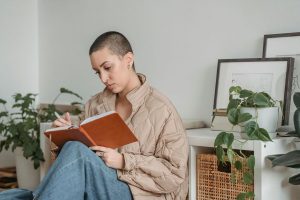Hair Loss: Understanding the Emotional Impact and Key Causes
Have you ever heard the saying, “your hair is your crown and glory”? It’s no secret that hair plays a big role in our self-image and overall appearance.
We style it, cut it, and color it to reflect who we are and how we want to be seen. So, what happens when we begin to lose that crown and glory?
The emotional impact of hair loss can be significant, affecting our self-esteem and how we perceive ourselves. In this article, we’ll delve into the cultural perceptions and emotional and psychological repercussions of hair loss, as well as key reasons behind it.
Cultural Perceptions and Stereotypes
When we think of beauty, youth and good health often come to mind. Society often views a full head of hair as a sign of vitality and well-being.
This perception is often perpetuated in the media through advertisements and movies, where full, luscious locks are often associated with sex appeal, success, and beauty standards. We can’t help but compare ourselves to these media representations, and when we don’t live up to this standard, we can feel inadequate.
The Emotional and Psychological Repercussions
The emotional impact of hair loss can be distressing, leading to anxiety and body image issues. Many people feel embarrassed and self-conscious about their hair loss.
They may avoid social situations, feel less confident in their relationships, and have lower self-esteem. The anxiety surrounding hair loss can even manifest physically, leading to sleep disturbances and a negative impact on overall health.
Key Reasons Behind Hair Loss
Hair loss can happen to anyone, regardless of age or gender. Fortunately, there are many causes of hair loss, and many options for treatment.
Let’s take a closer look at the most common reasons behind hair loss.
Stress
Hair loss can often be tied to stress. High-pressure jobs, toxic relationships, and even a traumatic event can all trigger hair loss.
The body is in a constant state of stress, and when stress begins to accumulate, the body can go into a state of shock, leading to temporary hair loss.
Diet
A healthy diet is essential for maintaining healthy hair. Nutrient deficiencies, such as iron and protein, can contribute to hair loss.
These deficiencies can occur when our diet is lacking in variety or quality. In addition, extreme weight loss or unhealthy food fads can also cause hair loss.
Hair treatments
We often look to hair treatments as a way to improve our hair’s appearance, but some of these treatments can actually lead to hair loss. Bleaches and intensive heat can weaken hair follicles, causing hair to fall out.
Using the wrong products or overusing certain treatments can also damage hair and contribute to hair loss. In conclusion, hair loss can take a toll on our emotional and psychological well-being, but understanding the reasons behind it can be empowering.
By identifying the causes of hair loss, we can better address the problem and take steps toward treatment and prevention. Remember, your hair doesn’t define you, but it’s important to take care of it, both for aesthetic reasons and overall health.
How to Combat Hair Loss: Living a Healthy Lifestyle and Seeking Help
Dealing with hair loss can be emotionally taxing, but there are ways to combat it. In our previous article, we talked about the cultural perceptions and emotional and psychological repercussions of hair loss, as well as key reasons behind it.
In this article, we’ll delve into the ways to combat hair loss, including healthy lifestyle choices and seeking help.
Healthy Lifestyle Choices
Making healthy lifestyle choices can go a long way in combating hair loss. Here are some tips to consider:
-
Specialist shampoos
There are many over-the-counter shampoos that are formulated to help stimulate hair growth. Look for shampoos that contain ingredients such as biotin, niacin, and caffeine, as these have been proven to promote hair growth.
-
Vitamins and Supplements
Making sure you’re getting enough vitamins and nutrients can help promote healthy hair growth.
B vitamins, zinc, and iron are all essential for healthy hair growth. Consider incorporating supplements or food sources rich in these vitamins into your diet.
-
Hair Transplant
Hair transplants are a surgical option that involves transplanting hair follicles from one area of the head to another.
This is an option for those who want to see more dramatic results.
Acceptance and Seeking Help
While adopting a healthy lifestyle is important, it’s also essential to address the emotional impact of hair loss. Here are some ways to seek help:
-
Counseling and therapy
Talking to a therapist can help address the emotional impact of hair loss. Counseling can help individuals work through feelings of anxiety, depression, and low self-esteem.
-
Body Image Issues
Many people struggling with hair loss also struggle with body image issues.
It’s important to understand that hair loss is not a reflection of an individual’s worth, and that there are ways to accept and embrace ourselves.
-
Support Groups
Joining a support group can be a great way to connect with others who are going through similar experiences. Support groups can provide a space to share experiences, offer advice, and provide emotional support.
In conclusion, there are many ways to combat hair loss, and adopting a healthy lifestyle is just one of them. Seeking help and support is also an essential component of addressing the emotional impact of hair loss.
If you’re struggling with hair loss, know that you’re not alone. Reach out for support and try some of these tips to help combat hair loss and promote healthy hair growth.
With patience and perseverance, you can take control of your hair and your health. In conclusion, understanding the emotional impact of hair loss, its key causes, and ways to combat it is essential for maintaining overall wellbeing.
Hair loss can cause significant emotional distress, impacting self-esteem, and body image issues. On the other hand, adopting a healthy lifestyle, using specialist shampoos, considering hair transplant, accepting hair loss as a natural part of life, and seeking help can help to prevent, manage, and promote hair growth.
By taking a holistic approach, individuals can address hair loss with confidence and have healthy hair and a positive attitude towards themselves. These tips can help individuals embrace their natural beauty and feel confident in their appearance.



